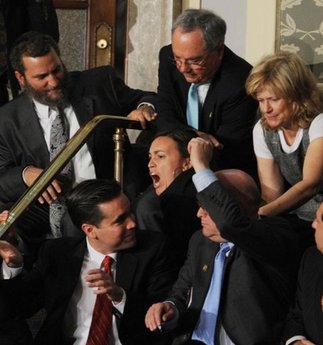Category: Press Releases
-
Jewish protester disrupts Netanyahu During Congressional Address
24 May 2011 | Move Over AIPAC During the Joint Session of Congress while Prime Minister Netanyahu was speaking, Rae Abileah stood up from the gallery and shouted “Stop Israeli War Crimes.” From the peace group CODEPINK, Rae is a 28 yr. old Jewish American of Israeli descent. She has traveled to Israel, the West…
-
Ahava’s theft of occupied natural resources finally exposed
21 May 2011 | Jordan Valley Solidarity After years of strenuous denial, Ahava Dead Sea Laboratories, an Israeli cosmetics firm with its main manufacturing plant in an illegal West Bank settlement, is proven by documentary evidence to be in violation of international law through its theft of Palestinian resources. This evidence was recently discovered by…
-
Spirit of Rachel Corrie attacked by Israeli navy
16 May 2011 | Perdana 4 Peace (Monday) The Spirit of Rachel Corrie Mission, involving a Malaysian owned ship carrying aid for Palestine, has been intercepted and attacked by the Israeli naval forces in the Palestinian security zone this morning at 0654 Jordan time. Currently the ship has been forced to anchor in the Egyptian…

